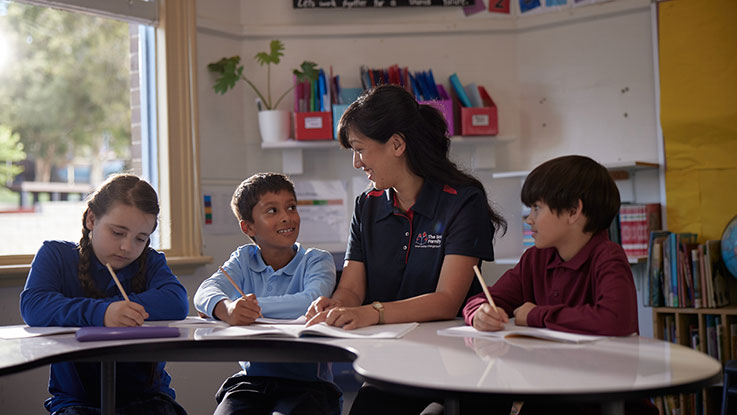
From helper to cheerleader: How your support changes as your child grows
Key takeaways
- Your support helps your child feel confident, motivated, and resilient.
- As your child grows, your role in their learning will change, but your support is always important.
- You don’t need to be an expert; being involved makes a big difference.

As your child grows, your role in their learning changes. You might start by helping with homework, but over time, you’ll become more of a cheerleader—offering encouragement, listening, and celebrating their efforts.
Learning starts at home
Children learn a lot at school, but what happens at home matters too. When you show interest, offer encouragement, and help build routines, your child is more likely to:
- Feel confident in their abilities
- Stay motivated, even when things get tough
- Ask for help when they need it
- Develop strong habits for learning and life
How your role changes over time
In the early years, you might sit beside your child while they read or help them sound out words. As they get older, they’ll need different kinds of support. You might help them plan their week, talk through a tricky assignment, or ask how school is going.
Eventually, your role becomes more about encouragement than direct help. You become your child’s cheerleader, celebrating their effort, listening when frustrated, and reminding them that mistakes are part of learning.
Eventually, your role becomes more about encouragement than direct help. You become your child’s cheerleader, celebrating their effort, listening when frustrated, and reminding them that mistakes are part of learning.
I used to help my son with every maths question. Now, I mostly ask how he’s going and remind him to take breaks. He’s learning to do things on his own, and I’m learning to let go a little.
Simple ways to stay involved—at any age
You don’t need to be a subject expert to support your child. Here are some simple ways to stay involved:
- Show interest: Ask what they’re learning and what they’re proud of.
- Create routines: Help them plan time for homework, rest, and fun.
- Encourage effort: Praise persistence, not just results.
- Talk about challenges: Let them know it’s okay to struggle sometimes.
- Celebrate progress: Even small wins deserve recognition.
Looking for practical tips by age group?
For age-specific advice and actions you can take at home, check out: Helping your child learn at home
How this helps your child succeed
When children feel supported at home, they’re more likely to:
- Stay engaged with school
- Develop independence and problem-solving skills
- Build emotional resilience
- Feel a sense of belonging and purpose
These skills help them succeed not just in school, but in life. Whether you're helping with homework or cheering from the sidelines, your support shapes how they see themselves as learners.
Where to find more support
You’re not alone. There are resources to help you support your child’s learning:
- Learning Potential: Australian Government site with tips, articles, and videos to help parents support learning at home.
- Education QLD: Resources for parents to support your child’s learning
- Raising Children Network: Learning for children, pre-teens and teenagers
We are here for you!

Your Family Partnership Coordinator is here to support you through each stage of your child's educational journey.
They can support you to problem-solve any challenges that may come up that affect your child's education.
They can also connect you to educational support programs or services in the community if you decide that's what you need.
You can find your Family Partnership Coordinator's contact details in My Smith Family.
End of article


